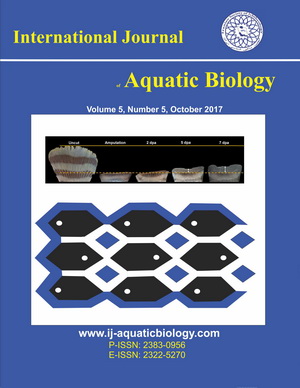The effects of dietary lysozyme on growth performance and haematological indices of rainbow trout (Oncorhynchus mykiss) fingerling
Downloads
Downloads
Abdel-Latif M.A., El-Far A.H., Elbestawy A.R., Ghanem R., Mousa S.A., Abd El-Hamid H.S. (2017). Exogenous dietary lysozyme improves the growth performance and gut microbiota in broiler chickens targeting the antioxidant and non-specific immunity mRNA expression. PLOS ONE, 12: e0185153.
Azimirad M., Meshkini S., Ahmadifard N., Hoseinifar S.H. (2016). The effects of feeding with synbiotic (Pediococcus acidilactici and fructooligosaccharide) enriched adult Artemia on skin mucus immune responses, stress resistance, intestinal microbiota and performance of angelfish (Pterophyllum scalare). Fish and Shellfish Immunology, 54: 516-522.
Blaxhall P.C., Daisley K.W. (1973). Routine haematological methods for use with fish blood. Journal of Fish Biology, 5: 771-781.
Chen Y., Zhu X., Yang Y., Han D., Jin J., Xie S. (2014). Effect of dietary lysozyme on growth, immune response, intestine microbiota, intestine morphology and resistance to Aeromonas hydrophilia in gibel carp (Carassius auratus gibelio). Aquaculture Nutrition, 20: 229-241.
Deng J., Bi B., An Q., kong L., Wang Q., Tao L., Zhang X. (2012). Effect of dietary inclusion of lysozyme on growth performance and plasma biochemical parameters of rainbow trout (Oncorhynchus mykiss). Aquaculture Nutrition, 18: 332-339.
FAO (2016). The state of world fisheries and aquaculture 2016. Food and Agriculture Organization of the United Nations, Rome, 243.
Gu W., Zhang G. (2008) Effects of lysozyme on growth performance and immune organ index of meat duck. Feed Industry, 29: 46-48. (In Chinese)
Guo Z., Li X., Xie X., Yi J., Lei M., Ren Y., Zheng J., Kuang L., Li C. (2010). Effects of lysozyme on growth performance and meat quality of 2–3 month-old meat rabbits. Southwest China Journal of Agricultural Sciences, 23: 1298-1302. (In Chinese)
Lu Y., Chen Z., Pan H. (2009). Effects of lysozyme on the growth performance and immune response of broiler chickens. Feed Research, 8: 5052. (In Chinese)
Gong M., Anderson D., Rathgeber B., MacIsaac J. (2017). The effect of dietary lysozyme with EDTA on growth performance and intestinal microbiota of broiler chickens in each period of the growth cycle. The Journal of Applied Poultry Research, 26: 1-8.
Hoseinifar S.H., Dadar M., Khalili M., Cerezuela R., Esteban M.í. (2016). Effect of dietary supplementation of palm fruit extracts on the transcriptomes of growth, antioxidant enzyme and immune-related genes in common carp (Cyprinus carpio) fingerlings. Aquaculture Research, doi:10.1111/are.13192.
Hoseinifar S.H., Soleimani N., Ringí¸ E. (2014). Effects of dietary fructo-oligosaccharide supplementation on the growth performance, haemato-immunological parameters, gut microbiota and stress resistance of common carp (Cyprinus carpio) fry. British Journal of Nutrition, 112: 1296-1302.
Hoseinifar S.H., Sun Y.-Z., Caipang C.M. (2017). Short chain fatty acids as feed supplements for sustainable aquaculture: an updated view. Aquaculture Research, 48: 1380-1391.
Magnadottir B. (2010). Immunological Control of Fish Diseases. Marine Biotechnology, 12: 361-379.
Modanloo M., Soltanian S., Akhlaghi M., Hoseinifar S.H. (2017). The effects of single or combined administration of galactooligosaccharide and Pediococcus acidilactici on cutaneous mucus immune parameters, humoral immune responses and immune related genes expression in common carp (Cyprinus carpio) fingerlings. Fish and Shellfish Immunology, 70: 391-397.
Nawaz A., Bakhsh javaid A., Irshad S., Hoseinifar S.H., Xiong H. (2018). The functionality of prebiotics as immunostimulant: Evidences from trials on terrestrial and aquatic animals. Fish and Shellfish Immunology, 76: 272-278.
í–ner M., Atli G., Canli M. (2008). Changes in serum biochemical parameters of freshwater fish Oreochromis niloticus following prolonged metal (Ag, Cd, Cr, Cu, Zn) exposures. Environmental Toxicology and Chemistry, 27: 360-366.
Rymuszka A., Studnicka M., Siwicki A.K., Sierosławska A., Bownik A. (2005). The immunomodulatory effects of the dimer of lysozyme (KLP-602) in carp (Cyprinus carpio L) in vivo study. Ecotoxicology and Environmental Safety, 61: 121-127.
Sanchez"Martínez J., Pérez"Castañeda R., Rábago"Castro J., Aguirre"Guzmán G., Vázquez"Sauceda M. (2008). A preliminary study on the effects on growth, condition, and feeding indexes in channel catfish, Ictalurus punctatus, after the prophylactic use of potassium permanganate and oxytetracycline. Journal of the World Aquaculture Society, 39: 664-670.
Saurabh S., Sahoo P. (2008). Lysozyme: an important defence molecule of fish innate immune system. Aquaculture Research, 39: 223-239.
Van Doan H., Hoseinifar S.H., Dawood M.A.O., Chitmanat C., Tayyamath K. (2017a). Effects of Cordyceps militaris spent mushroom substrate and Lactobacillus plantarum on mucosal, serum immunology and growth performance of Nile tilapia (Oreochromis niloticus). Fish and Shellfish Immunology, 70: 87-94.
Van Doan H., Hoseinifar S.H., Tapingkae W., Khamtavee P. (2017b). The effects of dietary kefir and low molecular weight sodium alginate on serum immune parameters, resistance against Streptococcus agalactiae and growth performance in Nile tilapia (Oreochromis niloticus). Fish and Shellfish Immunology, 62: 139-146.
Wang W., Sun J., Liu C., Xue Z. (2017). Application of immunostimulants in aquaculture: current knowledge and future perspectives. Aquaculture Research, 48: 1-23.
Yarahmadi P., Kolangi Miandare H., Hoseinifar S.H. (2016). Haemato-immunological and serum biochemical parameters, intestinal histomorphology and growth performance of rainbow trout (Oncorhynchus mykiss) fed dietary fermentable fibre (Vitacel®). Aquaculture Nutrition, 22: 1134-1142.
Yi-nan D. (2010). Effects of recombinant lysozyme on growth performance and carcass traits in broilers. Journal of Anhui Agricultural Sciences, 28: 094.
Zhong-Ke Z.S.-q.Z., Shi-ying W.M.-C.L., Jian-hua W.J.W. (2008). Effects of Lysozyme on Growth Performance, Metabolism and Immune indices of Broilers Fed with Corn-soybean Basal Diets. Chinese Journal of Animal Nutrition, 4: 0-20.
Wang X., Wang X., Wang G., Zhang Y. (2008). Effect of lysozyme on growth performance of weaned piglets. Heilongjiang Journal of Animal Science and Veterinary Medicine, 29: 7-8. (In Chinese)
Wu M., Zhang L., Wang Y., Cheng Y. (2010). Effects of dietary supplementation with lysozyme on growth performance of weaned piglet. Feed China, 11: 31-32. (In Chinese)








